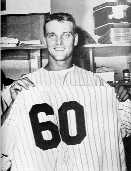|
HOT off the Press: This Month: |
|||
by Fine Diner
Comedian Billy Crystal did get that opportunity and made the best of it this year. He also made an incredible movie - 61* - for HBO about a season in New York that was every bit as magical, surreal and part of baseball lore to New Yorkers as "The Yaz Year" was to Bostonians. I knew I had to see it when aired by HBO, especially after seeing the previews and special half-hour segment the producers made on how they actually pulled it off.
That look and that torture the quiet man from Fargo, North Dakota endured during his greatest season ever were the main key to Crystal's film which not only captured the grandeur of chasing the most hallowed record in baseball at the time, but the anguish heaped upon a common man daring to take on the immortals. The record was supposed to be Mantle's, not Maris' in the eyes of most Yankee fans. Mantle was almost a reincarnated image of Ruth - gregarious, a partier, a womanizer, and a man who did magnificent things with his body despite the way he abused it. Mantle was also a lot more like the Babe than Joe DiMaggio, the legend who directly followed. DiMaggio was quiet, sullen and stayed to himself. In fact, Maris was a lot more like him than anyone else in pinstripes at the time. Besides the likeness of the actors to the heroes, Crystal's direction did a great job of catching the essence of the men and their own inner demons. While the film isn't recommended for young viewers for the strong language, Crystal had opted for the realism, in every aspect of their characters and lives no matter how painful. It was a bold move, displaying to the world the nature of the icons and revealing the flaws that were usually hidden from the general public behind closed doors. But he also blended positive aspects of their characters in with the flaws, reminding us they were complex mortals. What made the movie and real life even more intriguing was the fact that the two teammates were so markedly different, each battling his own demons but uniting as brothers to help each other see their way through a great, yet confusing and stressful season. Maris was the "mere mortal" daring to take on the Babe's record. He had gone to the Yankees via a 1959 trade with the Athletics that had New York giving up Hank Bauer and Don Larson, famous for fashioning the World Series no-hitter. He had only been in the majors a couple of years after arriving with Cleveland, and the year before the trade only batted .273 with 16 homers. What Maris was always known for was not his bat but his arm - he had one of the best in baseball at the time and was a great right fielder. But in his first Yankee season, 1960, he chased Mantle to the home run title, finishing just one behind The Mick's 40. Maris' main problem was not dealing well with the public, which often got him in trouble. As the movie portrayed and history revealed, Maris was straightforward yet misunderstood, and Mantle was outgoing and a bit of a prankster in the Ruth mold. Thus, when the pressure got to him Maris was often his own worst enemy. As the season wore on and he had a shot at the record, he had to fight the demons of chasing something that was so painful to desire as well as a bloodthirsty press and public. Then there was Commissioner Ford Frick who, in July of that year, deemed that any new record during the expanded 162-game schedule would forever carry an asterisk. Forever, that is, until Fay Vincent removed the asterisk from the record in 1991, six years after Maris' death. That added pressure for Maris to hit the 61st by game 154 to be "official." Mantle, who ironically became roommates with Maris that year, was also his own worst enemy. He drank to excess, handled money poorly and had trouble being faithful. Which makes him not unlike a number of ball players. Mantle was also chasing ghosts his whole life. The Oklahoman was brought to Yankee Stadium as a 19-year-old in 1951, as the heir apparent to DiMaggio. The movie touches on Mantle's feeling about how he felt spurned by DiMaggio and how he just wanted to be Mickey Mantle the Yankee; that a rivalry was built for him that he neither felt nor wanted. In actuality, Mantle was the only Yankee, or perhaps only player to aspire to being DiMaggio. He could quite possibly be the best player who ever lived, but was never able to reach his full potential because of the combination of his excesses and injuries. In his earlier years Mantle was the fastest player in the league getting from home to first (3.1 seconds), which accounted for his 153 career steals. In double figures between 1956 and 1961, Mantle struggled to steal any after 1962. He played most of his career in pain; much of it attributable to a major leg injury. Despite all the injuries, Mantle courageously brought himself to the field day after day, ending his career with a still-record 2,401 games played as a Yankee. Mantle was also the greatest switch hitter who ever lived. Batting from both sides of the plate he not only hit 536 homers, but also batted .298 for his career. The sportswriters anticipated the homer race after the previous season, but Maris got off to a slow start, not hitting his first until the 11th game. Mantle by this time had five. Maris steadily gained until he passed Mantle on June 9, 18 homers to 16. The M&M Boys continued banging them out until on July 15th, the 86th game of the season, Maris' 35th put him 20 games ahead of Ruth's pace. Two days after came Frick's edict, which only seemed to bother Maris as far as having even more reporters hounding him. The movie points out well the frustration and Catch-22 Maris felt - if he didn't go for homers he was giving up on the record, and if he went for them, then he was giving up on his team. One of the movie's most poignant lines comes during the chase when a reporter asks him why he was focusing so much on the record and he replied "I'm not focusing on the record, you guys are." The stress heaped on him got to Maris. His hair started falling out, he got even more withdrawn, if that was possible. He started snapping at the press. But he kept hitting homers. Unlike the Babe, who hit them in clumps, Maris produced a steady diet of round trippers. Only five times did he hit more than one in a game, but never more than two. He hit his 59th in game 54, but try as he might, he couldn't break the record that day. As it turned out, Maris was dealing with his
own curse of the Bambino. Without the Babe there would be
no icon to tamper with, no reporters following him home
and no hair falling out. And though he had to wait until
the 158th and 162nd games to get the last two, both
coming at Yankee Stadium, were swipes at the ghost - the
first against Baltimore, Ruth's home town and the second
against the Red Sox, whose trade allowed Babe to set the
record in the first place. |
|||
|
|||



 But what really struck me as a
baseball fan first introduced to the sport in the 1960s
and familiar with both the Yankees and Sox, was how much
Barry Pepper actually looks like Roger Maris. We're not
talking here about his swing and mannerisms, although
under the tutelage of former Red Sox outfielder Reggie
Smith he did a masterful job of picking up those fine
points. What I am talking about is the eerie resemblance,
right down to the stoic look.
But what really struck me as a
baseball fan first introduced to the sport in the 1960s
and familiar with both the Yankees and Sox, was how much
Barry Pepper actually looks like Roger Maris. We're not
talking here about his swing and mannerisms, although
under the tutelage of former Red Sox outfielder Reggie
Smith he did a masterful job of picking up those fine
points. What I am talking about is the eerie resemblance,
right down to the stoic look.